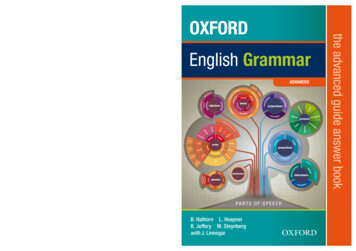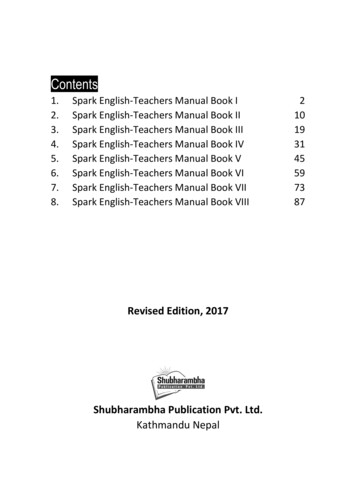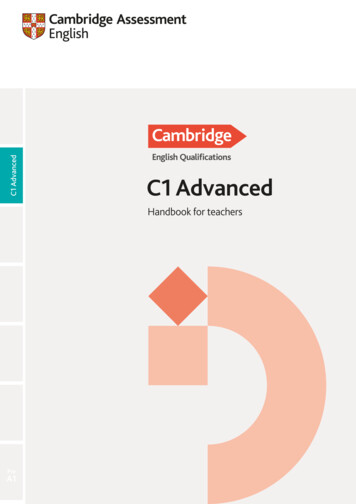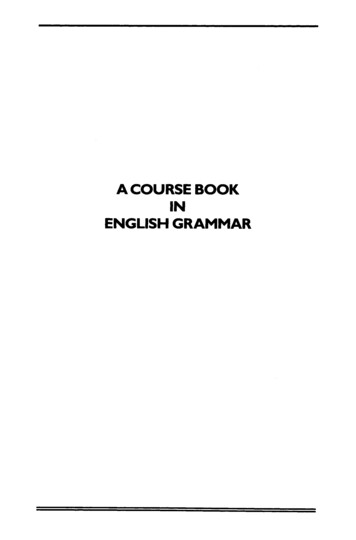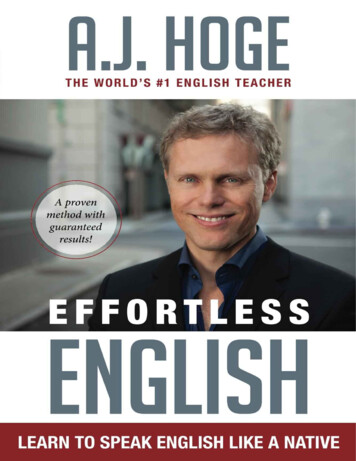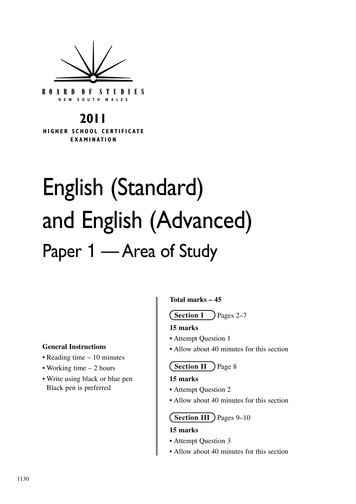
Transcription
2011H I G H E R S C H O O L C E R T I F I C AT EE X A M I N AT I O NEnglish (Standard)and English (Advanced)Paper 1 — Area of StudyTotal marks – 45Section IGeneral Instructions Reading time – 10 minutes Working time – 2 hours Write using black or blue penBlack pen is preferredPages 2–715 marks Attempt Question 1 Allow about 40 minutes for this sectionSection IIPage 815 marks Attempt Question 2 Allow about 40 minutes for this sectionSection IIIPages 9–1015 marks Attempt Question 3 Allow about 40 minutes for this section1130
Section I15 marksAttempt Question 1Allow about 40 minutes for this sectionAnswer the question in a writing booklet. Extra writing booklets are available.In your answers you will be assessed on how well you: demonstrate understanding of the way perceptions of belonging are shaped in andthrough texts describe, explain and analyse the relationship between language, text and contextQuestion 1 (15 marks)Examine Texts one, two, three and four carefully and then answer the questions on page 7.Question 1 continues on page 3–2–
Question 1 (continued)Text one — Visual text: Many ways to belongQuestion 1 continues on page 4–3–
Question 1 (continued)Text two — Transcript from a panel discussion on Belonging to PlacesSpeaker 1It seems that there is a strong link between our modern humanity’s disconnect frombelonging to the land and our inability to truly feel a sense of belonging. I have movedaround my entire life. I love to move and experience different places, but I never trulyfeel like I belong in any one place. I envy people I meet who know their neighbourhoodsinside and out, have friends they have seen on a daily basis for decades, and who wouldnever even consider leaving their hometown because it’s their family Speaker 2I think about my own life that was spent on the move, never really being ‘fromanywhere’. I spent such a short time in most places, especially as a child. My Dad’s jobkept us moving. There was always something new to explore and encounter. Alwayssomething beautiful and special to appreciate in each area that we moved to. I do notreally have a sense of place though. Not a place that I am ‘from’ I do understand theidea that people associate themselves with place and it becomes who they are.I guess, even though I can’t say I belong to one certain place, I can still acknowledge thatwhile I’m here, I belong on this earth, and if I am to belong somewhere, I must doeverything in my power to contribute positively Speaker 3I definitely feel that there is something missing from my understanding of the worldbecause I don’t have an anchoring sense of place in a specific location that has beenwhere my people belonged for centuries Without knowing where you come from, it isvery difficult to know who you are.Speaker 4I find myself shifting between values that grow out of belonging to the land by living onit, and not being ‘from’ that place I, too, have moved a great deal and have sometimeslonged for a place where I can touch the soil and say, ‘I belong to it, and it to me’. Thereality is so often that jobs whose payment sustains us, also keep us moving betweenlandscapes. But in doing so myself, I have learned so much from the different cultures inwhich I have lived, and I am glad for that personal experience. Experiencing the worldfrom multiple perspectives can be healthy.Speaker 1I agree I also think a sense of adventure can come from a key place which brings anunderstanding of the meaning of belonging yet I wonder if today, we somehow measureourselves by what belongs to us, instead of what we belong eproduced with permission of Dr Madronna Holden.Question 1 continues on page 5–4–
Question 1 (continued)Text three — Nonfiction extract from From Here to ThereAwaiting copyrightQuestion 1 continues on page 6–5–
Question 1 (continued)Text four — Fiction extract adapted from BrooklynThis is an extract from a novel that tells the story of a young woman, Eilis, whoemigrates from a small Irish town to Brooklyn, America. She leaves behind herentire life to begin a new life in an unfamiliar place. In this extract, Eilis is in herrented room in Brooklyn, reading letters from her mother, sister and brother.The letters told Eilis little; there was hardly anything personal in them and nothing that soundedlike anyone’s own voice. Nonetheless, as she read them over and over, she forgot for a momentwhere she was and she could picture her mother in the kitchen taking her notepad andenvelopes and setting out to write a proper letter with nothing crossed out. Rose, she thought,might have gone into the dining room to write on paper she had taken home from work, usinga longer, more elegant white envelope than her mother had. Eilis imagined that Rose, when shehad finished, might have left hers on the hall table, and her mother would have gone with bothletters in the morning to the post office, having to get special stamps for America. She couldnot imagine where Jack had written his letter, which was briefer than the other two, almost shyin its tone, as though he did not want to put too much in writing.She lay on the bed with her letters beside her. For the past few weeks, she realised, she had notreally thought of home. The town had come to her in flashing pictures and she had thought,of course, of her mother and Rose, but her own life in Enniscorthy, the life she had lost andwould never have again, she had kept out of her mind. Every day she had come back to thisroom in this house full of sounds and gone over everything new that had happened. Now, allthat seemed like nothing compared to the picture she had of home, of her own room, the housein Friary Street, the food she had eaten there, the clothes she wore, how quiet everything was.All this came back to her like a terrible weight It was as though an ache in her chest wastrying to force tears down her cheeks, despite her enormous effort to keep them back She was nobody here in Brooklyn. It was not just that she had no friends and family; it wasrather that she was a ghost in this room, in the streets of Brooklyn on the way to work, on theshop floor. Nothing meant anything. The rooms in the house at Friary Street belonged to her,she thought; when she moved in them she was really there. In the town, if she walked to theshop, the air, the light, the ground, it was all solid and part of her even if she met no-onefamiliar. Nothing here in Brooklyn was part of her. It was false, empty, she thought. She closedher eyes and tried to think, as she had done so many times in her life, of something she waslooking forward to, but there was nothing. Not the slightest thing. Nothing maybe exceptsleep there was nothing she could do. It was as though she had been locked away.COLM TÓIBÍNExtract from Brooklyn by Colm Toibin reprinted by permission of Pan Macmillan Australia Pty Ltd. Copyright Colm Toibin 2009.Question 1 continues on page 7–6–
In your answers you will be assessed on how well you: demonstrate understanding of the way perceptions of belonging are shaped in andthrough texts describe, explain and analyse the relationship between language, text and contextQuestion 1 (continued)Text one — Visual text(a)Select one aspect of the visual text and explain how it offers a perspective onbelonging.2Text two — Transcript(b)How are personal insights into belonging to places conveyed in the transcript?2Text three — Nonfiction extract(c)From his experience of new places, what does Jack come to understand aboutbelonging?3Text four — Fiction extract(d)“Nothing here in Brooklyn was part of her.”Discuss the importance of memories to Eilis’s sense of belonging.3Texts one, two, three and four — Visual text, Transcript, Nonfiction extract andFiction extract(e)Analyse the relationship between places and identity in TWO of these texts.End of Question 1–7–5
Section II15 marksAttempt Question 2Allow about 40 minutes for this sectionAnswer the question in a SEPARATE writing booklet. Extra writing booklets are available.In your answer you will be assessed on how well you: express understanding of belonging in the context of your studies organise, develop and express ideas using language appropriate to audience, purposeand contextQuestion 2 (15 marks)Compose a creative piece that captures the significance of remembered places to the experienceof belonging.You may use the visual image as stimulus for your creative writing.–8–
Section III15 marksAttempt Question 3Allow about 40 minutes for this sectionAnswer the question in a SEPARATE writing booklet. Extra writing booklets are available.In your answer you will be assessed on how well you: demonstrate understanding of the concept of belonging in the context of your study analyse, explain and assess the ways belonging is represented in a variety of texts organise, develop and express ideas using language appropriate to audience, purposeand contextQuestion 3 (15 marks)Explore how perceptions of belonging and not belonging can be influenced by connections toplaces.In your response, refer to your prescribed text and at least ONE other related text of your ownchoosing.The prescribed texts are listed on the next page.Question 3 continues on page 10–9–
Question 3 (continued)The prescribed texts are: Prose Fiction – Amy Tan, The Joy Luck Club– Jhumpa Lahiri, The Namesake– Charles Dickens, Great Expectations– Ruth Prawer Jhabvala, Heat and Dust– Tara June Winch, Swallow the Air Nonfiction– Raimond Gaita, Romulus, My Father Drama– Arthur Miller, The Crucible: A Play in Four Acts– Jane Harrison, Rainbow’s Endfrom Vivienne Cleven et al. (eds), Contemporary Indigenous Plays Film– Baz Luhrmann, Strictly Ballroom– Rolf De Heer, Ten Canoes Shakespeare– William Shakespeare, As You Like It Poetry– Peter Skrzynecki, Immigrant Chronicle* Feliks Skrzynecki* St Patrick’s College* Ancestors* 10 Mary Street* Migrant hostel* Post card* In the folk museum– Emily Dickinson, Selected Poems of Emily Dickinson* 66 This is my letter to the world* 67 I died for beauty but was scarce* 82 I had been hungry all the years* 83 I gave myself to him* 127 A narrow fellow in the grass* 154 A word dropped careless on the page* 161 What mystery pervades a well!* 181 The saddest noise, the sweetest noise– Steven Herrick, The Simple GiftEnd of paper– 10 –
BLANK PAGE– 11 –
BLANK PAGE– 12 – Board of Studies NSW 2011
The Joy Luck Club – Jhumpa Lahiri, The Namesake – Charles Dickens, Great Expectations – Ruth Prawer Jhabvala, Heat and Dust – Tara June Winch, Swallow the Air Nonfiction – Raimond Gaita, Romulus, My Father Drama – Arthur Miller, The Cru
